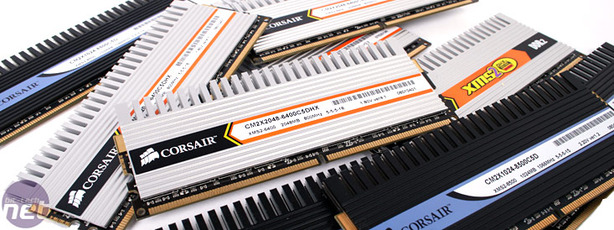
So, Is More Memory Better?
While these few tests don't cover the incredible breadth of possible PC usage scenarios, there is significant evidence to suggest that 4GB should be the target that people should aim for when buying a new PC or upgrading...at least if you're using Vista. But as much as we hate to admit it, we'll all eventually leave XP at some point because of DirectX 10.Having said that, it's not like you can't exist on just 2GB, especially if you're just doing general productivity - as I sit here on my home machine with just 2GB of DDR2 in it, Vista sidebar tells me that I'm currently at 42 percent memory use with a dozen Firefox tabs open, Microsoft Word 2007 sitting in the background alongside some music playing in Foobar, and there's also MSN with several chat windows open as well. I'm clearly not pushing the boundaries of even 2GB here.
Then I go to work where I have the luxury of a behemoth workstation which features a quad core Xeon, chugging on 8GB of memory. This regularly pushes 3.5-4GB of memory use when I'm running multiple Firefox windows, Photoshop, Email, MSN, music, Office applications, etc. It's the same stuff as I do at home, but because I do more things concurrently (because I have the luxury of extra screen real-estate to dive into), I need more memory to compensate. If you're like Tim and don't know what the close button actually does, then you'll sit at 70-80 percent of memory use in another 8GB Xeon workstation.
For your working or recreational desktop environment, there's no definitive answer: it's all about how you use your system. More memory doesn't affect boot times in the right way, however having more things pre-cached should lead to a faster Windows experience once you sit down to work or play.
If you are opening and editing lots of photos, or doing some serious, multi-layered image work or huge amounts of impressive video manipulation, memory alone won't help - a faster hard drive to get the data in and out of memory in the first place will certainly be a benefit, as will a faster CPU to process it all (until GPGPU applications arrive). Opening ~20 photos doesn't make a huge difference in extra performance between 2GB and 4GB, and Adobe itself has commented that until recently it has seen no point in making a 64-bit version of Photoshop - that's not a conclusion to be ignored by such an industry moulding company.

When it comes to gaming though, there is a more straight-forward answer: having (at least) 4GB can really make the experience that much smoother and that much more involving in the latest games.
In multiple scenarios - task switching out of games, load times of save games, and even in-game itself - 4GB or more of memory makes the experience faster and smoother. We've got upcoming triple-A titles like FarCry 2, Stalker: Clear Sky or Crysis: Warhead, which will be at least no less intensive than what is currently available, so it's absolutely worth doubling up over 2GB if you're a keen member of the PC gaming master race. For a few less intensive titles like Call of Duty 4, it doesn't make a blind bit of difference between 2GB and 4GB of memory. Consider what you play before you dive into your next purchase.
If we were upgrading now, or in the future, 4GB seems like a logical choice unless you're on an incredibly tight budget. If you're a keen gamer then it's a must, just to cover all ground. We'd even try to encourage some performance DIMMs too, if you can.
Some people might be concerned with the life-span of DDR2 considering (the expensive) Nehalem platform just around the corner which will launch as triple channel DDR3 only (with Intel's X58 chipset), however the consumer side of this won't be available for another year yet and considering the epic price difference between DDR2 and DDR3, we'd still recommend a DDR2 setup for at least another quarter, even though DDR3 prices are beginning to drop quite rapidly now.
If you're a super multi-tasker, when it comes to 8GB or using four DIMMs things can get a little sketchy depending on the board you use and having used 8GB of memory on a consumer board and a workstation, there's a reason why people buy workstations - because it is absolutely more reliable. If we even waved a hand near our Asus P5Q Deluxe when it had four DIMMs sitting in it, it was enough to make it blue-screen or jitter. In comparison, my workstation has never missed a beat even though it's like an oven in the V1110.
In all, there's no outright conclusion here - but like quad cores, we can't deny that having more spare resources available is always a good thing.

MSI MPG Velox 100R Chassis Review
October 14 2021 | 15:04








Want to comment? Please log in.